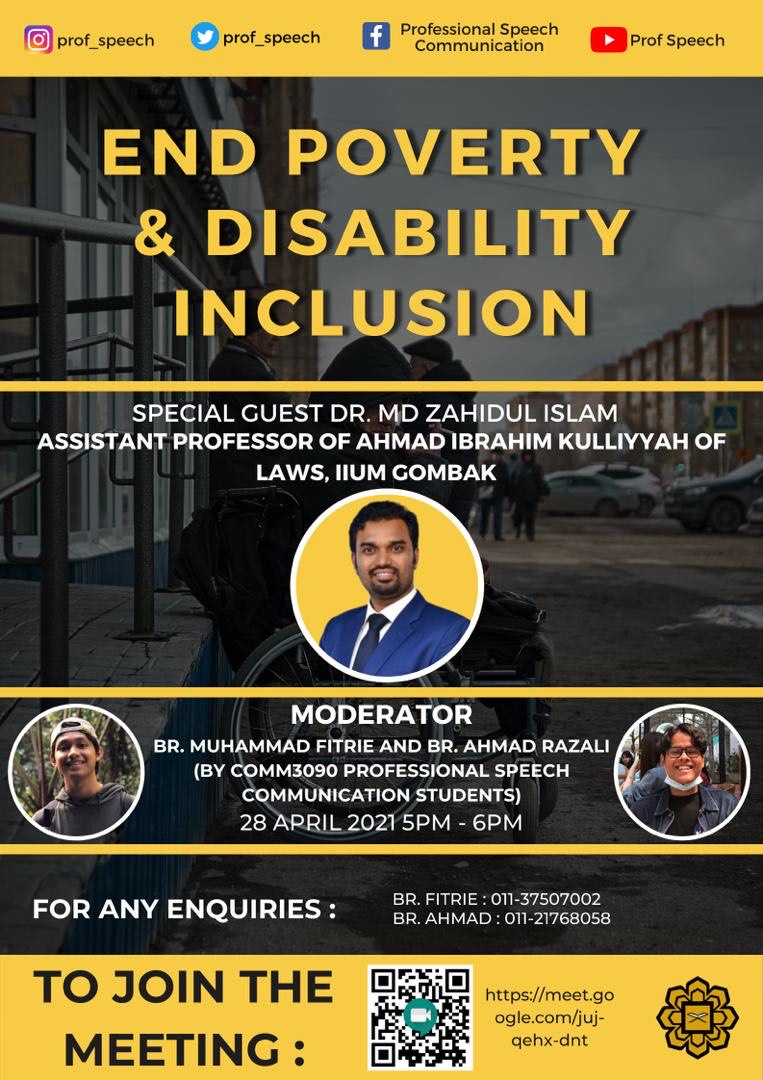By Muhammad Nasrullah and Hazira Hasan
GOMBAK, 4 May 2021: Enduring poverty as well as neglecting the disabilities are among the reasons some countries cannot move forward in prospering their economic development.
œA community has to come forward together with the government, as society needs to change their mindset by educating themselves on the disabled to eradicate poverty and disability discrimination, Assistant Professor of IIUMs Kulliyyah of Laws (AIKOL), Dr. Muhammad Zahidul Islam said.
The fruitful webinar was hosted by IIUM Communication major students, Muhammad Fitrie and Ahmad Razali on the topic that concerns how to œEnd Poverty and Disability Inclusion.
Dr. Zahidul Islam, a Bangladeshi born citizen, a professor in law and has an expertise in Communication and Media Law, Constitutional Law, and Human Rights Law, was invited as a guest to share his knowledge and thoughts regarding the issue.
He published a number of article journals “ one of his prominent articles is on a legal analysis regarding the legal rights of the people of Bangladesh.
When asked what disability inclusion is, he said, it is œgenerally how we can incorporate the disabled people in the mainstream, understanding the way disabled people function and how they participate in society and being able to give them equal opportunities.
If more citizens are being included to participate in the countrys development despite their abilities, the more human resources could be utilised for the country itself. In this way, poverty could be eradicated along with including the disabled people by giving them the same treatment as able people to work for living.
Dr. Zahidul said that according to the World Health Organisation (WHO), every country around the world has around 3-15% of disabled people in their population.
Apart from being a Bangladeshi citizen, the reason he chose to conduct the research on Bangladesh is due to its concerning situation where the size of the country is nearly half the size of Malaysia, albeit is inhabited by at least 170 million, but only able to feed around 30 million of its citizens. It is a very huge gap in comparison to the whole population they have.
Dr. Zahidul made several comparisons to other countries including Australia that have specific laws for the disabled, which is the Disability Inclusion Act 2014, œBecause they understand the importance of disability inclusion, it is for the sake of their development and economic growth.
However, the Bangladesh government is not really concerned to put relevant efforts in combating the issue.
In regards to this, there are 10% disabled people with 20-30% unemployed in the country. The decades are changing over time, yet their citizens are still in a stagnant state, not able to get the support that they are supposed to have.
He said, œThe enforcement of the law is the main problem in Bangladesh. Not enough people are working in the enforcement of the law. If the law is being enforced 100%, they might be able to eradicate poverty and solve the disability problem in Bangladesh.
The Bangladeshi mindset also plays an important role in the poverty and disability issue. As mentioned by Dr. Zahidul, œWe have to change our mindset in treating the person with disabilities (PWDs). Sadly, their society often looks down on the disabled.
Specifically, employers treat the disabled as weak and not strong enough to do work in the workplace even though some of them are way more skillful.
As they should give a RM20,000 salary for a disabled, they think it should be decreased to RM10,000 because they perceive the disabled does not deserve the amount. A mindset does indeed play a huge part in helping the PWDs, despite hoping only for the government to implement some laws.
He emphasised, œOther developed countries like the United States and Europe need to come and help to break the poverty cycle.
The concept of œPoverty Trap is applicable there where it refers to an economic system where it is difficult to escape from poverty. It is a constant cycle created due to a mix of factors such as access to education, healthcare, and wealth which continue from generations to generations.
Good news is, when asked about the situation in Malaysia, he applauded the Malaysian government for raising awareness by having numerous national organisations for disabilities and social welfare associations supporting the disabled, creating numerous disabled-friendly infrastructure in malls, schools, public transport, tax exemption, accessible workplace, and other public places to cater to their needs.
Asked on reasons he was interested in doing research about PWDs, especially in Bangladesh, he answered, œI want to contribute to the ummah. Dr. Zahidul intended to give constant efforts and contributions on the poverty issue in both Bangladesh and Malaysia.
Dr. Zahidul added, œIslam covers both affairs which are here and hereafter. As a Muslim, if we utilise the zakat properly, the poverty will disappear.
By utilising the function of zakat, Muslims will get the same treatment. This is the way to achieve equality and avoiding discrimination towards the disabled. œThe idea of equality came from the Islamic principles, he said.
He also mentioned that other religions also are very concerned in managing the same treatment despite backgrounds. Nobody should be left behind.
Albeit, he urged listeners to keep on with the effort on raising awareness as the government may put in effort to incorporate them, but concluded it would be futile if society did not play their role in accepting them, which negatively affect their access to employment, education and health, resulting in them being marginalised from social participation, and depriving them of their rights to contribute effectively to the economic development.***
